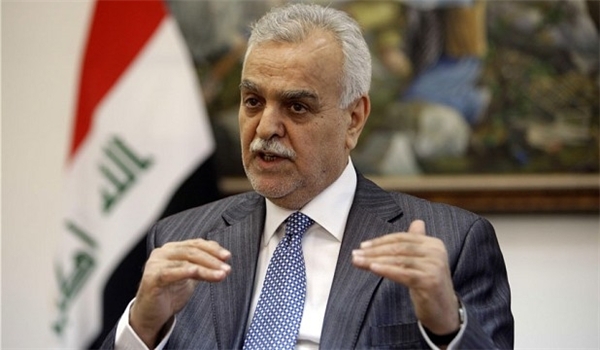Saudileaks: Docs Disclose Link between Saudi Arabia, Fugitive Iraqi VP Tariq al-Hashemi

Saudi Arabia has been in touch with former Iraqi vice president Tariq al-Hashemi, who was accused by Iraq’s Judicial Council of orchestrating bombing attacks in 2011, disclosed one of the documents released by the Yemen Cyber Army after it hacked the Saudi Foreign Ministry in May.
The Saudi Foreign Ministry was hacked by the Yemen Cyber Army in May, and a copy of its information was sent to FNA and another one to the whistleblower website WikiLeaks.
One of the documents from the Saudi embassy in Jordan refers to two letters addressed to former Iraqi vice president Tariq al-Hashemi, who was residing in Erbil at the time, from the Saudi crown prince and the head of the intelligence agency.
On December 2011, Iraqi government forces surrounded al-Hashemi’s residence in the Green Zone. Baghdad banned him from travelling abroad, and finally, Iraq’s Judicial Council issued an arrest warrant for al-Hashemi, accusing him of orchestrating bombing attacks. Hashimi was accused of running a hit squad, and killing Shiite government officials, but he denied all charges against him in a press conference in the Kurdish regional capital Arbil. He later ran away from Iraq’s Kurdistan region to Turkey and has between commuting between the two territories on a daily basis. His terrorists have been a part of the ISIL army since the Takfiri militants invaded Iraq last Summer.
Late in May, the Yemen Cyber Army released a portion of the information and documents that it had gained in its recent cyber attack on Saudi Arabia’s Foreign, Interior and Defense Ministries.
The Yemen Cyber Army announced that it has hacked the website, servers and archives of Saudi Arabia’s Foreign, Interior and Defense ministries and would release thousands of these top secret documents.
The group claimed that it “has gained access to the Saudi Ministry of Foreign Affairs (MOFA) network and have full control over more than 3000 computers and servers, and thousands of users. We also have access to the emails, personal and secret information of hundreds of thousands of their staff and diplomats in different missions around the world”.
The hackers’ statement, which said the cyber army has also attacked the Saudi Interior and Defense ministries and vowed to release their details later, was carried by several globally known hackers websites.
Following the hack in May, the Yemen Cyber Army sent a copy of its information to FNA and another one to the whistleblower website WikiLeaks.
“WikiLeaks released over 60,000 documents on Friday and vowed to release the rest in coming weeks, but we plan to release the documents in separate news items since many of them contain the names of foreign nationals who have demanded visit to Saudi Arabia, for example for Hajj pilgrimage, and their names have been mentioned among the Saudi agents. Thus releasing the list of names and documents might hurt innocent individuals who have done nothing, but applied for visa at a Saudi embassy for doing Hajj pilgrimage,” FNA English Editor-in-Chief Seyed Mostafa Khoshcheshm said.
“The number of the documents is way beyond the 500,000 that has been announced by WikiLeaks, but they need to be checked first to make sure that they do not contain misleading information and are not harmful to innocent people,” he added.







